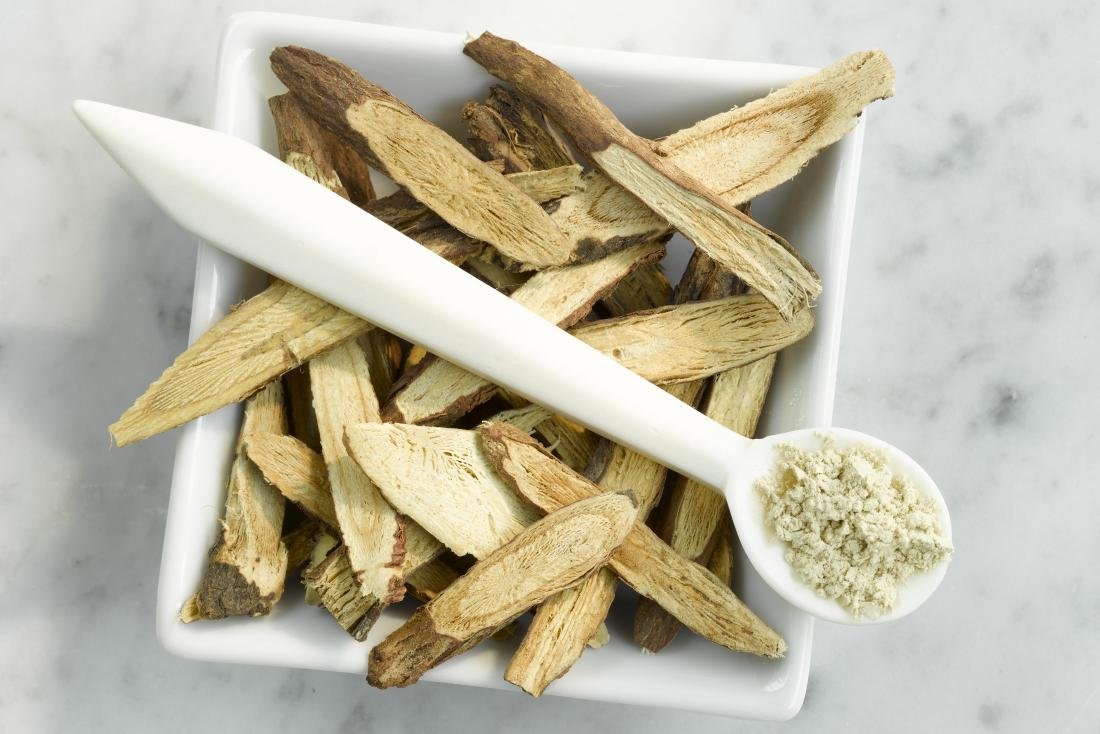Licorice, known to science as glycyrrhizin glabra, is a member of the pea family that is widely cultivated throughout Greece and Turkey. The key therapeutic compound contained in licorice is glycyrrhizin, and this compound is found in the underground stem of the tall purple flowered shrub.
In addition to the glycyrrhizin, licorice contains hundreds of other healthful ingredients, including flavonoids and plant estrogens known as phytoestrogens. It is thought to have a number of healing properties, including anti-inflammatory properties and the ability to sooth stomach upset.
Major benefits of licorice
Licorice has long been used to treat stomach upset, and this remains one of the chief benefits. In addition, it is currently being studied for everything from its ability to reduce coughs to its possible use as an anticancer agent.
The glycyrrhizin contained in licorice is known to have many important benefits to the human body, and it is known to be useful in treating a wide variety of ailments. For instance, it appears to have the ability to boost the immune system by increasing levels of interferon, an important compound in fighting viral attacks.
In addition, its root contains many powerful antioxidant vitamins, as well as many important and healthful phytoestrogens. These plant- based estrogens are known to provide some of the same functions as the natural estrogens found in the body.
Moreover, licorice helps to protect the digestive system from corrosive stomach acids through the stimulation of substances that coat the esophagus and the stomach. This characteristic of licorice makes it useful for a number of different ailments, including many digestive and intestinal disorders.
Licorice may also be valuable at treating and controlling various respiratory conditions, including chest congestion, coughing and sore throats. It helps loosen and thin the mucus in the airways, resulting in a more productive cough and thus a reduction in phlegm and mucus. It is also known to help reduce bronchial spasms and to soothe sore throats. It is even thought to help fight the viruses that cause recurrent respiratory conditions.
Another important potential benefit is the ability to reduce the symptoms of chronic fatigue syndrome and fibromyalgia. It is thought that this effect is produced by enhancing cortisol activity. Conditions like fibromyalgia and chronic fatigue syndrome are known to be sensitive to cortisol levels, thus the effect of licorice on cortisol is thought to provide relief from these troubling conditions.
Licorice is also thought to protect the liver and promote healing in the organ as well. It is even thought that the anti-inflammatory properties of licorice may be able to soothe the liver inflammation associated with hepatitis. In addition, it also helps to fight the virus responsible for hepatitis, and the antioxidants it contains help to promote overall liver health.
Additional information:
Licorice is often combined with other herbs and added to herbal blends, and it is particularly effective at disguising the bitterness of many herbal remedies.
Licorice is available in a variety of different forms, including wafers, tinctures, tablets, liquids, dried herbs, teas, creams, lozenges and capsules. For licorice products that contain glycyrrhizin, it is important to look for preparations that have been standardized to contain a 22% concentration of glycyrrhizinic acid or glycrrhizin.
Most disorders that respond to licorice respond well to 200 mg of standardized extract three times daily, or 20 to 45 drops of liquid medication three times per day. For coughs and chest congestion, the traditional remedy is to drink one cup of licorice tea three times each day. This licorice tea is made by pouring eight ounces of very hot but not boiling water over two teaspoons of dried herb. This mixture is then allowed to steep for 10 minutes and then strained.
A blended herbal tea used for coughs can be made by steeping one teaspoon each of dried licorice and slippery elm in very hot water. This tea is drunk three times per day, but it should be continued for no longer than three weeks.
Originally posted 2019-10-17 12:26:27.

